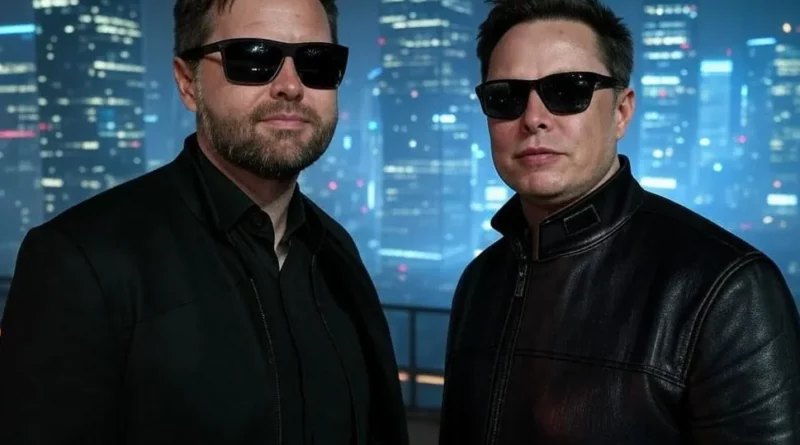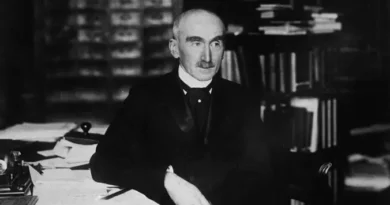The Intellectual Environment of Donald Trump: From Populism to Transhumanism and Technofeudalism
Source : arktosjournal.com – january 8, 2024 – Alexander Markovics
https://www.arktosjournal.com/p/the-intellectual-environment-of-donald-trump
Abonnez-vous au canal Telegram Strategika pour ne rien rater de notre actualité
Pour nous soutenir commandez les livres Strategika : “Globalisme et dépopulation” , « La guerre des USA contre l’Europe » et « Société ouverte contre Eurasie »
Alexander Markovics argues that Trump’s resurgence represents a revolutionary transformation in the American zeitgeist, driven by a populist-futuristic nationalism that seeks to replace the liberal-globalist establishment with a new cadre of strong leaders, visionary innovators, and patriotic trailblazers.
Trump’s Election as a Revolution
In the United States, Donald Trump did not simply win the election — what occurred was a revolution. This statement by the German-born Palantir CEO, billionaire, and Silicon Valley tech guru hints at a shift in the American zeitgeist. Replacing a Biden administration characterized by visually unsettling figures like Rachel Levine (Health Secretary), grotesque personalities like Kamala Harris, and an evidently incapable president — altogether a symbol of liberal globalization — are new figures symbolizing a new era.
These include men like the physically fit future Health Secretary Robert F. Kennedy Jr., visionary transhumanist Elon Musk, war hero Peter Hegseth, and also feminine women, such as the combative deep state critic Tulsi Gabbard. Representing a patriotic America, they stand as the antithesis of the postmodern “freak show” under Joe Biden.
The Bro-Revolution: Strong Men and Inventors
This power shift has been partially labeled as a “bro-revolution,” encompassing not only “gymbros” who frequent the gym but also “techbros” who impress with their inventive spirit. These are individuals of action who appear determined to advance their nation, embodying America’s technological pioneering spirit while reflecting a degree of conservatism — a unification of dreamers and builders striving to make America great again while seeking to conquer space.
In a sense, they embody the “American Dream” of freedom, self-achievement, and the relentless overcoming of human limitations — a vision that inspires optimism for the future but can also pose challenges for others. What ideas drive these individuals, and what can we expect from them?
Robert F. Kennedy Jr.: A Health Secretary Opposing Big Pharma
Among the most “controversial” appointments in the eyes of globalists is undoubtedly Robert F. Kennedy. At the height of the COVID pandemic, he accused Anthony Fauci of orchestrating a coup against Western democracies through vaccination policies and seizing control of the media and healthcare systems. He further described the COVID vaccine as the deadliest in history.
Kennedy aims to restore America’s health, tackling obesity, prescription drug dependence, and sedentary lifestyles. As a critic of an overreaching state that invades every aspect of human life, he positions himself as a reformer against the excesses of modern governance.
Elon Musk: Interplanetary Transhumanism
Whether it’s advancing AI beyond human intellectual capabilities, developing the Neuralink brain chip, or conquering space with reusable rockets, Musk is a classic representative of the extropian school of transhumanism. This ideology believes in redeeming humanity through technology, surpassing its limitations — intellectual or planetary — to secure its future.
In Trump’s future administration, Musk is expected to take on an advisory role aimed at streamlining government efficiency and reducing its size, inspired by Argentine Zionist and anarcho-capitalist Javier Milei. Musk’s transhumanist ambitions, including his vision of colonizing Mars while the U.S. faces significant earthly challenges, can be viewed critically. Nonetheless, he exemplifies the cowboy spirit of the United States: constantly pushing toward new frontiers and conquests. Musk also expresses strong anti-woke sentiments, prominently showcased on his platform X (formerly Twitter).
JD Vance: A Disciple of Curtis Yarvin
In addition to his hardline foreign policy stance towards Iran, JD Vance is known as a follower of neo-reactionary thinker Curtis Yarvin. Yarvin is an outspoken critic of American democracy, advocating its transformation into a monarchy led by a CEO. The reasoning is simple: while elected politicians exploit the state for personal gain during their terms, a monarch would manage the state as personal property, ensuring more responsible governance.
This vision envisions a neofeudalist state where the economy subsumes the government, treating it as an asset to ensure its efficiency. Yarvin also champions capitalism and technocracy to optimize human life, while criticizing the “Cathedral” — the societal power of journalism and academia, which he accuses of promoting wokeness and democracy.
The American billionaire Peter Thiel is loosely associated with this Silicon Valley intellectual movement, advocating a right-leaning libertarianism.
A New American Nationalism?
With Trump’s new team and their ideas, we may witness the end of the liberal-globalist internationalism that sought to impose rainbow liberalism on the world. Instead, a new, populist, and futuristic American nationalism emerges — one that prioritizes U.S. power interests over human rights, democracy, and liberalism.
Its goal is to make America great again, even if it requires transhumanist, futuristic, or neofeudalist concepts.
(Translated from the German)




